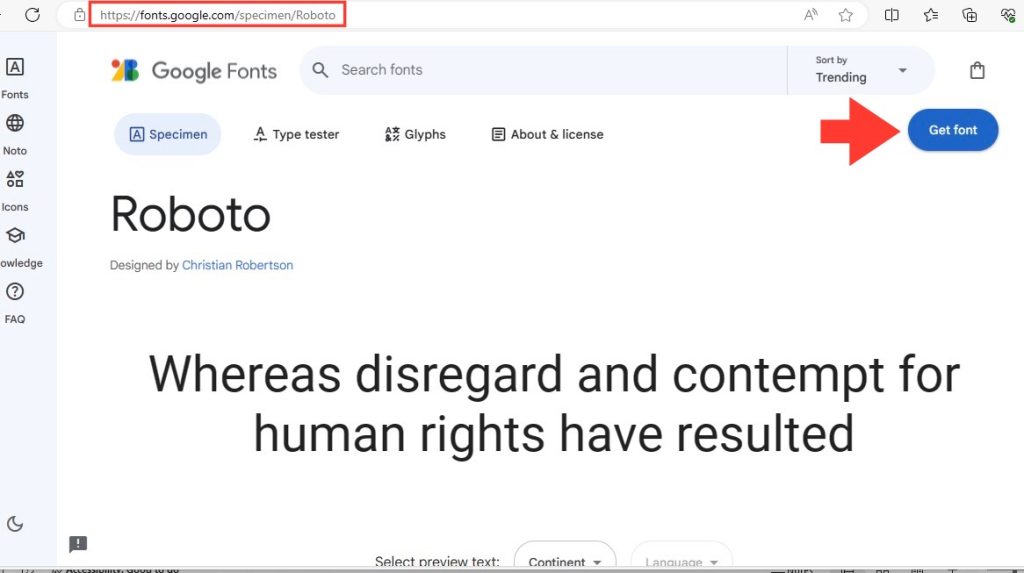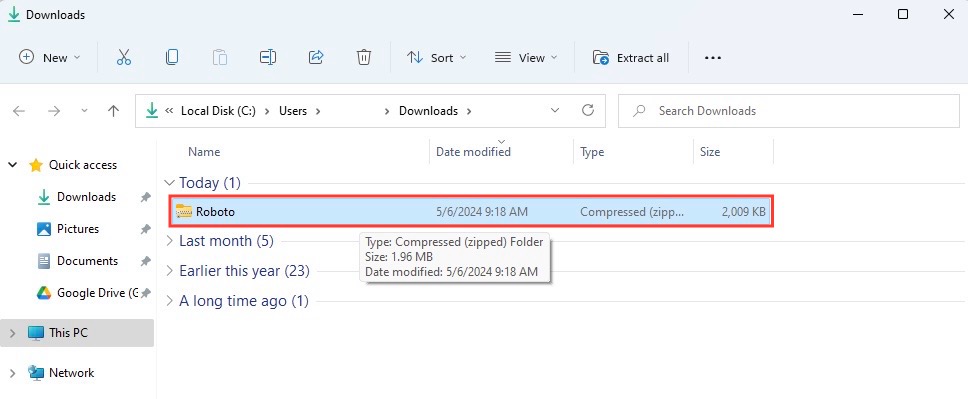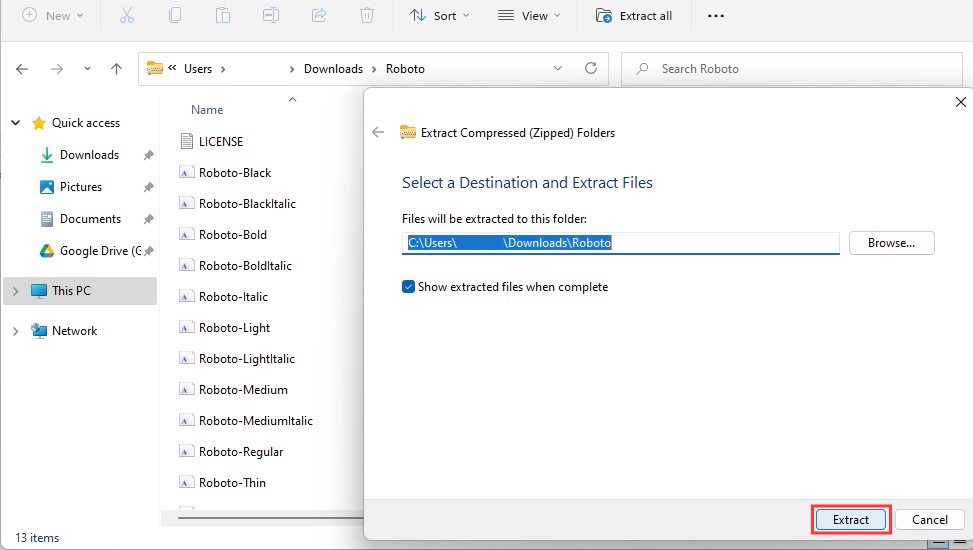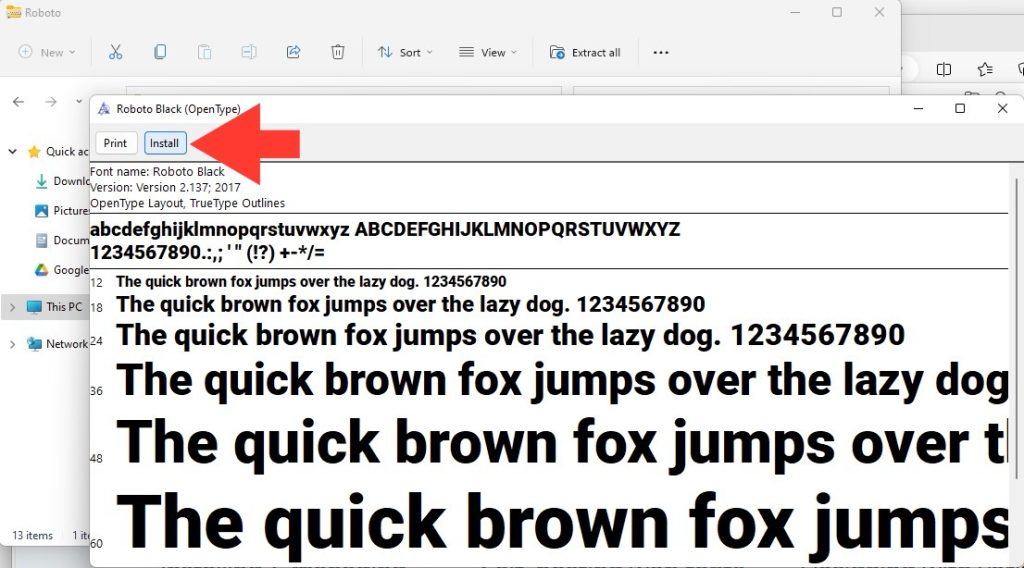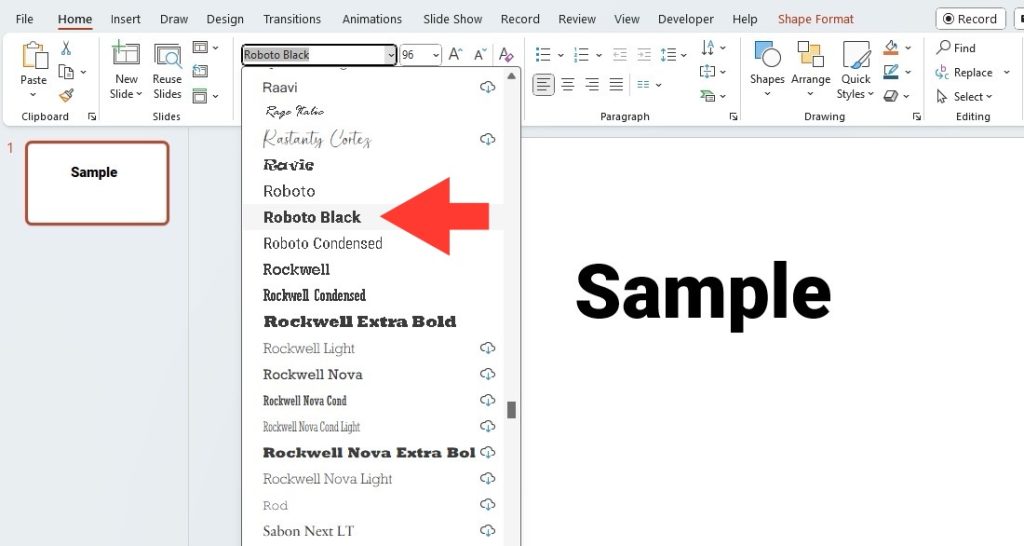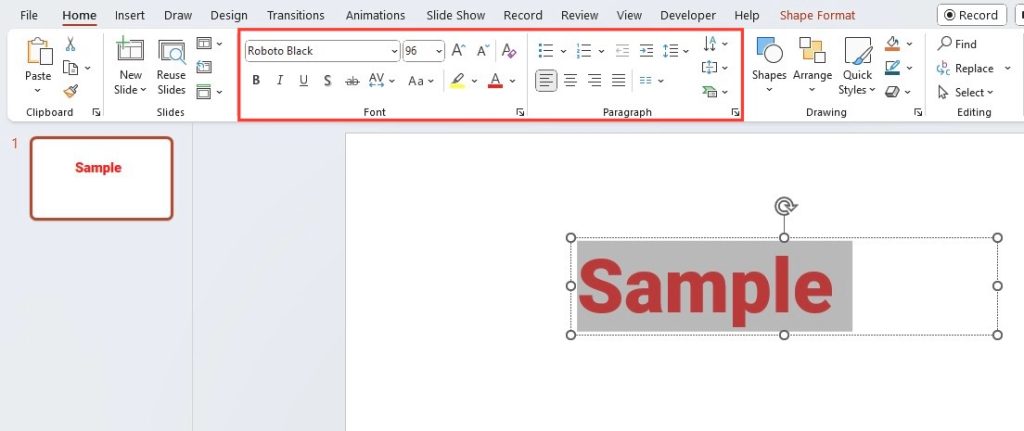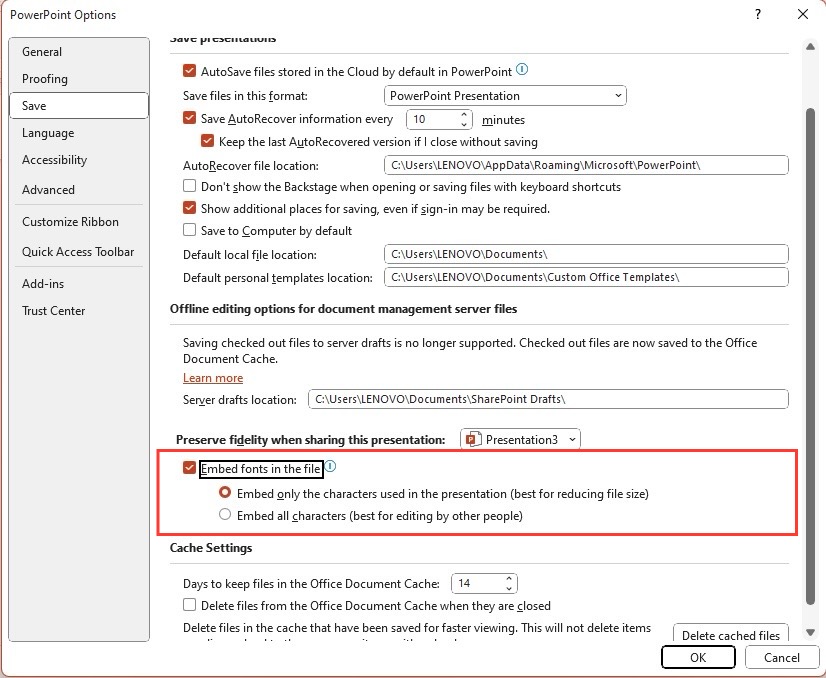Learn about Excel with our Free Microsoft Excel Online Course!
Why Adding New Fonts Can Transform Your Slides
Stepping away from the default fonts in PowerPoint and introducing new ones can be a game-changer for your slides. They can breathe new life into your presentation, offering a refreshingly unique twist that captivates your audience. You’re not just providing information; you’re telling a story, and the fonts you choose are the narrators. They can either speak in a monotonous drawl or with a flair that piques interest. By customizing your typography, you enhance not only the aesthetic but also the persuasive power of your presentation.
Key Takeaways
- To add new fonts to PowerPoint, download the desired font file, extract it if necessary, right-click on the file, and select ‘Install’. This will make the font available in PowerPoint under the Font dropdown in the Home tab.
- Ensure readability and professionalism by choosing easily legible fonts like Arial or Helvetica for your slides, and limit font usage to two or three types to keep the presentation cohesive and organized.
- Embed custom fonts within the PowerPoint file before sharing your presentation to ensure that it displays correctly on different devices, maintaining the intended visual impact and legibility.
Table of Contents
A Step-by-Step Guide to Finding and Downloading Stylish Fonts
Locating Custom Fonts for PowerPoint Use
When you’re on the hunt for that perfect typeface to spice up your slides, it all starts with finding the right custom fonts for PowerPoint use. Begin your search by exploring a trove of online resources. Websites like Google Fonts, Font Squirrel, and DaFont offer an array of typefaces, from the sleek and professional to the playful and avant-garde. Remember to keep in mind the tone of your presentation and the compatibility of the fonts with your PowerPoint version. Download fonts from reputable sources to avoid any licensing issues or digital hiccups.
Installation Simplified: Adding Fonts to PowerPoint
For Windows Users: How to Make New Fonts Available
For Windows users, making new fonts available is a breeze. If you’ve spotted the perfect font to enhance your PowerPoint slides, here’s what to do:
STEP 1: Get the font you want from a reliable source like Google Fonts or Adobe Fonts.
STEP 2: Double-click the downloaded font file and hit “Install”.
STEP 3: Launch PowerPoint > Go to the “Home” tab.
STEP 4: Select Text Box or Text: Click where you want to use the font or highlight existing text. > Click the “Font” dropdown and select your installed font.
STEP 5: Modify size, color, etc., as needed.
For Mac Users: Installing Fonts for a Visual Upgrade
As a Mac user ready to give your PowerPoint presentations a visual upgrade, installing new fonts is a simple process:
STEP 1: Download the font you’ve chosen to your computer.
STEP 2: Navigate to your Downloads folder or the location where your new font file is saved.
STEP 3: Double-click on the font file, which will open a font preview window.
STEP 4: Look for the “Install Font” button in this preview window and click on it.
STEP 5: After the installation is complete, open the Font Book app to see your newly added font featured among your collection.
These new fonts are now fully integrated into your system, and you can jazz up your PowerPoint slides with them. Remember, installed fonts are available immediately in PowerPoint, and you can start using them as soon as you restart the application.
Embedding Fonts to Preserve Style Across Devices
Ensuring Font Consistency in Shared Presentations
Ensuring font consistency in shared presentations is critical, especially if you’re collaborating with others or presenting on different devices. Without consistent fonts, your carefully designed slides could lose their intended formatting, leading to unprofessional-looking presentations. To avoid this, always check that the fonts used in your presentation are common system fonts that most computers will have installed. If you’re using custom or non-standard fonts, PowerPoint offers a feature to embed them directly into your presentation file. This embedding process ensures that the font style stays intact, no matter where your presentation is opened.
How Embedding Fonts Prevents Unwanted Surprises
Embedding fonts in your PowerPoint presentation is a foolproof way to maintain the integrity of your design, preventing any unwelcome surprises when the slides are viewed on different systems. This subtle yet powerful feature allows you to keep your text looking exactly as you intended, irrespective of whether the viewing computer has the custom fonts installed. It eliminates the risk of automatic font substitution, which can alter the layout and look of your slides, often resulting in misalignment, awkward spacing, and even missing symbols. So, when you’re looking to share or display your presentation with confidence, remember to embed the fonts to ensure your audience sees your work precisely as you created it.
Design Tips for Maximum Impact with New Fonts
Choosing Fonts that Reflect Your Presentation’s Tone
Choosing fonts that reflect the tone of your presentation is akin to selecting the right outfit for an event—it’s all about setting the appropriate mood. If you aim to exude professionalism and authority, serif fonts like Times New Roman or Garamond may be your allies. For a clean, modern look, sans-serif fonts such as Arial or Helvetica can do wonders. Want to inject some creativity or informality? Fonts with a hand-drawn or script style might be just the ticket. Just make sure the readability remains pristine across all slide elements and screen sizes.
Best Practices in Pairing Fonts for Cohesive Design
When pairing fonts, the art lies in striking a balance that complements your overall design while ensuring legibility. Aim to pair a standout font for your headers with a more subdued font for body text. For example, a bold sans-serif font can grab attention for titles while a classic serif can keep the body easy on the eyes. The key is contrast – if one font is heavy, combine it with a lighter counterpart. However, avoid mixing too many font styles which can clutter your presentation. Two to three font choices should be sufficient.
Here are a few best practices:
- Contrast is crucial: Mix a serif with a sans-serif to delineate headers from body text.
- Stick to similar font families for harmony.
- Large blocks of text should always be in an easily readable font.
- Experiment with font weights and styles for a dynamic hierarchy.
- Ensure consistency throughout your presentation for cohesion.
Troubleshooting Common Font Issues in PowerPoint
When Installed Fonts Don’t Appear: What to Check
If your newly installed fonts aren’t showing up in PowerPoint, it’s time to play detective. Here are a few things to check:
- Ensure the font is installed correctly. If you installed the font while PowerPoint was open, you might need to restart the application for changes to take effect.
- Verify that the font file isn’t still zipped. If it is, extract the file before attempting to install it.
- Confirm compatibility; some fonts are designed exclusively for either PC or Mac and may not function outside their intended environment.
- If you installed the font for your user account only, switch to installing it for all users on the device.
- Sometimes glitches in the font cache can cause issues, so try clearing the cache.
By systematically checking through these potential hiccups, you’ll likely resolve your font visibility issue in no time.
Sharing Files with Non-Standard Fonts: Tips & Tricks
When it comes to sharing PowerPoint files that contain non-standard fonts, a little foresight can prevent any disruption in your presentation’s layout and design. Start with embedding the fonts directly into your PowerPoint file; this will ensure whoever opens the presentation will see it as intended, even without the font installed on their system. When embedding isn’t an option, consider converting text-heavy slides to PDFs to maintain the formatting, or share the font files along with clear installation instructions if the license allows. Otherwise, stick to universal fonts accessible on all systems to maintain a consistent look and feel.
Elevate Your Slide Aesthetics
Best Practices for Using Custom Fonts in PowerPoint
When using custom fonts in PowerPoint, best practices can make all the difference between a presentation that looks professional and one that doesn’t:
- Pair fonts with purpose: Choose a readable font for body text and a more distinct font for headings.
- Keep font count low: To avoid visual chaos, limit yourself to two or three fonts within a presentation.
- Stay consistent: Use the same fonts throughout your presentation to ensure a cohesive look.
- Mind the mood: Align the choice of fonts with the tone of your content and the response you hope to elicit from your audience.
- Accessibility is key: Ensure that your fonts are legible on all potential display screens and devices.
By adhering to these principles, your custom fonts will serve to enhance your presentation’s effectiveness, leaving your audience impressed and engaged.
Going Beyond Standard Fonts
Embedding Fonts in Your PowerPoint File
Embedding fonts in your PowerPoint file ensures that your presentation looks the same everywhere—no matter who opens it or on what machine. To embed fonts:
STEP 1: Go to ‘File’ in your PowerPoint. > Choose ‘Options’ from the menu.
STEP 2: In the PowerPoint Options dialog box, select the ‘Save’ tab.
STEP 3: Under ‘Preserve fidelity when sharing this presentation’, find and check ‘Embed fonts in the file’.
STEP 4: From there, decide whether to embed only the characters used in the presentation (to minimize file size) or all characters (if others might edit the presentation).
Remember: embedding all characters will increase your file size, but it guarantees full editability for anyone you share the file with.
FAQ Section
How Do I Know Which Fonts are Best for My Presentation?
Choosing the best fonts for your presentation hinges on several factors. Consider your audience—what will resonate with them the most? Think about the tone of your presentation; formal content calls for more traditional fonts, like Times New Roman or Arial, while a creative talk could benefit from more stylized fonts. Test readability by previewing your slides on various devices and at different sizes to ensure clarity. Above all, your font selection should aim to complement your message without distracting from it.
What Should I Do if a New Font Isn’t Showing Up in PowerPoint?
If your new font isn’t showing up in PowerPoint, try the following tips:
- Close PowerPoint and reopen it to refresh the font list.
- Ensure you’ve installed the font correctly. For Windows, right-click and select ‘Install for all users’. On Mac, use the Font Book to ‘Install Font’.
- Look for font file issues. If it’s zipped, unzip it, or redownload if the file is corrupted.
- Check compatibility. Ensure the font is designed to work with PowerPoint.
- If all else fails, clear the font cache on your operating system, as it sometimes causes conflicts with new fonts being recognized.
Should trouble persist, you might need to consider alternative fonts or reach out for technical support.
Can I Use These Fonts in Other Microsoft Office Applications?
Absolutely! Once you’ve downloaded and installed a new font on your computer, it becomes available in all Microsoft Office applications. Whether you’re working in Word, Excel, or Outlook, you’ll find your new fonts in the dropdown menu where you can select them the same way as you would in PowerPoint. Just keep in mind that if you share documents using these custom fonts, you’ll need to use the same embedding practices as in PowerPoint to ensure they display correctly on other people’s systems.
Are There Any Copyright Issues to Consider When Using New Fonts?
When using new fonts, copyright issues are indeed something to be mindful of. Fonts are creative works and often subject to licensing agreements. Before using a font, especially for commercial purposes, review its licensing terms – some are free for personal use but require a purchase or a specific license for business use. Always respect the creator’s rights and restrictions to avoid legal complications. If you’re unsure, reaching out to the font creator or distributor for clarification is a good practice.
John Michaloudis is a former accountant and finance analyst at General Electric, a Microsoft MVP since 2020, an Amazon #1 bestselling author of 4 Microsoft Excel books and teacher of Microsoft Excel & Office over at his flagship Academy Online Course.
